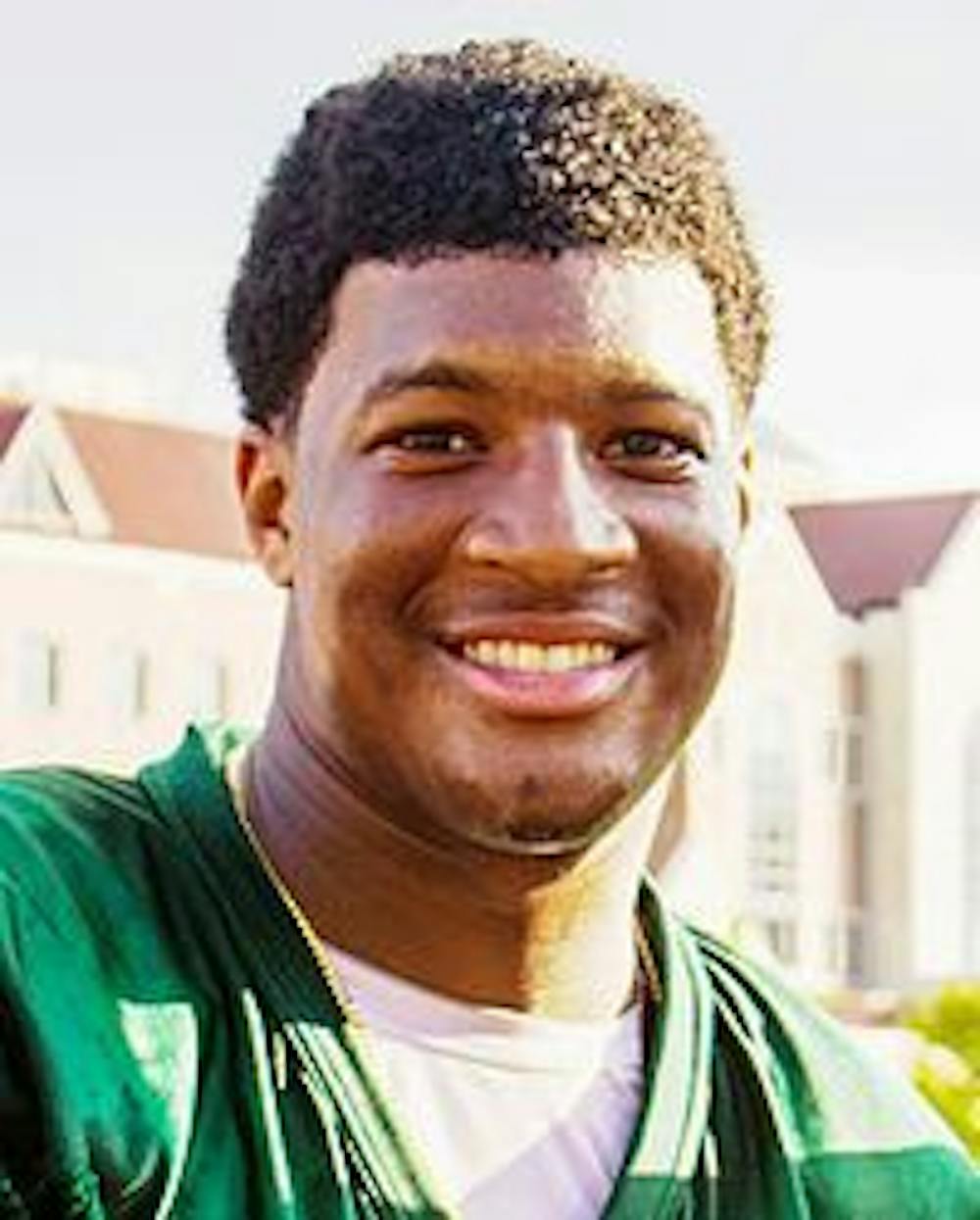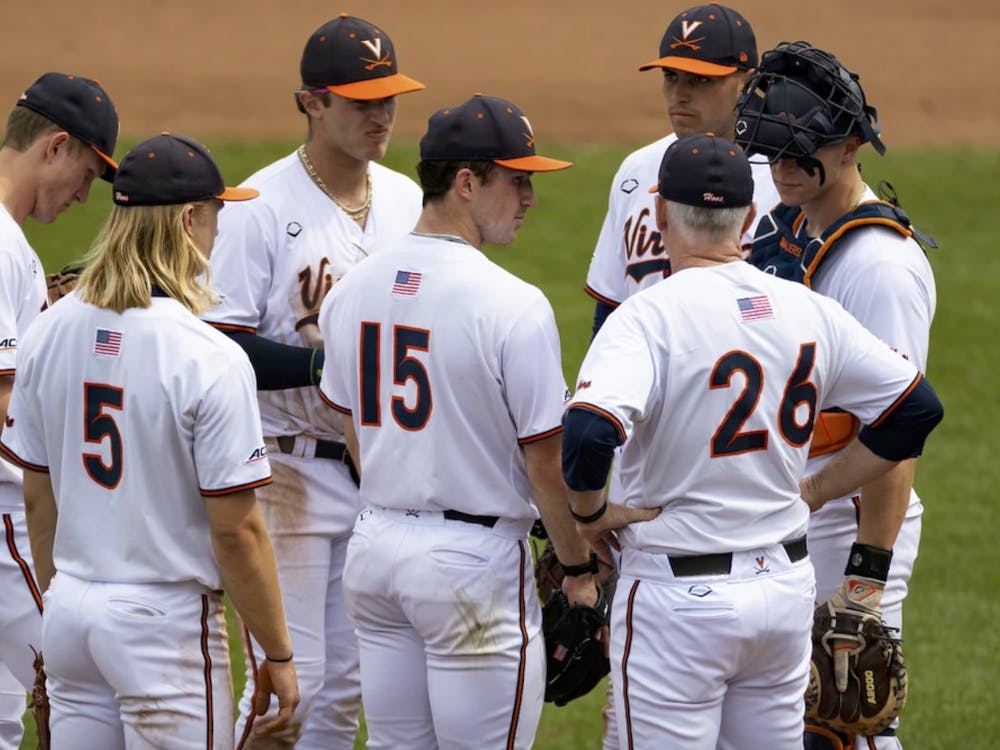English is my dad’s second language, so throughout Fall Break he would see reports on ESPN about Jameis Winston, but he didn’t know what they were about. He asked me what Winston had done this time and wondered whether he was going to be suspended. I wondered the same thing, but of all the “Developing Stories” and red-highlighted text on Sportscenter, nothing mentioned a suspension of the Florida State quarterback. The school is investigating an alleged sexual assault in 2012 and more recent news that Winston had signed autographs for money.
As a University student committed to the Honor Code and a longtime Cavalier sports fan who has seen her fair share of player dismissals, it seems odd to me that Winston would continue playing despite his troubled past and the new allegations against him.
Winston redshirted his freshman year of college football. As a result, he was quite quiet on the field, but the same couldn’t be said about his off-the-field life. In November of that year, Winston and his teammate Chris Casher were handcuffed by police on campus for shooting squirrels with a pellet gun. They were released, and no charges were filed against them. Later that night, Winston and teammates did more than $4,000 of damage with a BB- and pellet-gun battle at Winston’s apartment complex.
A few weeks later, a fellow student accused Winston of rape. The police dropped the investigation, but the school is now investigating Winston under the student code of conduct. Winston has also been accused of stealing soda and crab legs in Tallahassee, and earlier this year Winston jumped on a table on campus and delivered a sexually driven and expletive-fueled one-line speech from a popular internet meme. He was originally suspended for just the first half of Florida State’s game against Clemson Sept. 20 before the suspension was extended to a full game.
Winston was not suspended this past weekend against No. 8 Notre Dame for the autograph allegation, despite the fact that Georgia running back Todd Gurley was suspended just the week before for the same allegation in connection with the same company.
When asked by Seminole head coach Jimbo Fisher if he did indeed sign autographs for money, Winston denied the allegation. Fisher has repeatedly defended Winston, citing “innocent until proven guilty” as the reason Winston should continue playing.
This past Saturday, Winston proved to everyone once again that he was a Heisman-caliber quarterback by leading his team to a comeback win against the Fighting Irish for Florida State’s 23rd-straight win. After the game, Fisher told Winston to stay humble, “act very passive right here and get people back on your side.”
Time will tell whether Winston will get people back on his side, whether the allegations against him are true and whether Florida State values the athlete side of a student-athlete more than the student side. But as a Cavalier watching from the sidelines, the one thing that is clear to me is that Winston wouldn’t have had a chance to redeem himself at Virginia.
In 2008, Virginia quarterback Jameel Sewell was left off the roster because of academic ineligibility. Sure, the team struggled, but the school stayed true to its tough academic policy. Around the same time, replacement quarterback Peter Lalich was kicked off the team for violating his probation stemming from an alcohol-related arrest. In 2010, basketball star Sylven Landesberg was removed from the team for academic reasons.
But doing the right thing doesn’t always translate to an automatic loss. When men’s lacrosse player George Huguely was charged with 2010 murder of his girlfriend Yeardley Love, a player on the women’s lacrosse team, the men’s team cleaned up its program under the leadership of then-senior Bray Malphrus.
During the 2011 season, Shamel and Rhamel Bratton, two of the team’s star players, were suspended and eventually removed from the roster for unknown reasons. Without the Bratton twins, the team moved away from a midfield-dominated offense to an attack-led offense spearheaded by Steele Stanwick.
The team had its rough patches, but it went 13-5 on the season. Going into the NCAA Tournament, no one picked Virginia to win, but Stanwick, Malphrus and the new offense led the Cavaliers to a national championship, their first since 2006. Stanwick was later given the award for the best lacrosse player in the country, the Tewaaraton Trophy, even though he didn’t score in the title game against Maryland.
More recently, in 2013, quarterback Phillip Sims was thought to be the next savior of Virginia football after transferring from Alabama the previous season. But he, too, was removed from the team and school for undisclosed reasons. Head coach Mike London had this to say about the incident, putting the Virginia athletics mission statement into perspective:
“The thing we tell the young men who come to the University of Virginia to receive a world-class education and play for our football program is pretty simple. Go to class. Show class and treat people with dignity and respect. Those directions are pretty easy to follow and they will lead you on a path of success. When an individual strays from those directions, it is very disappointing to me. Phillip Sims did not make the commitment he needed to succeed here.”
I love being a Virginia Cavalier because the athletes aren't exempt from the University’s honor code, and the people involved with the teams emphasize doing the right thing, win or lose.







